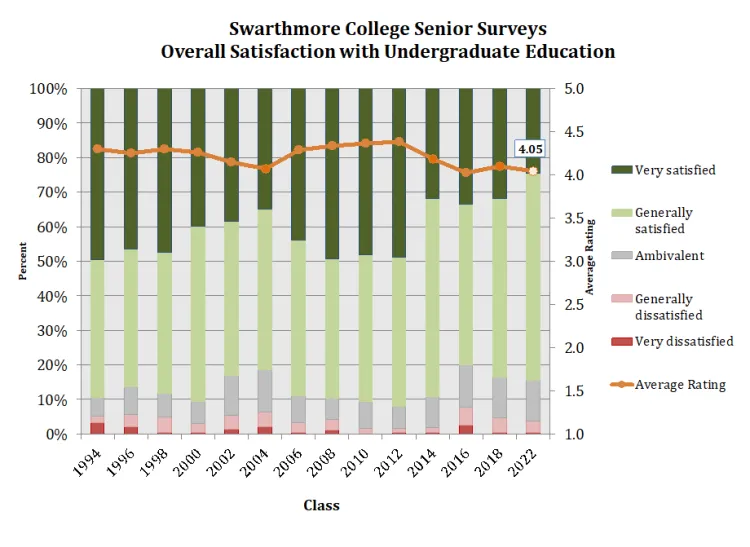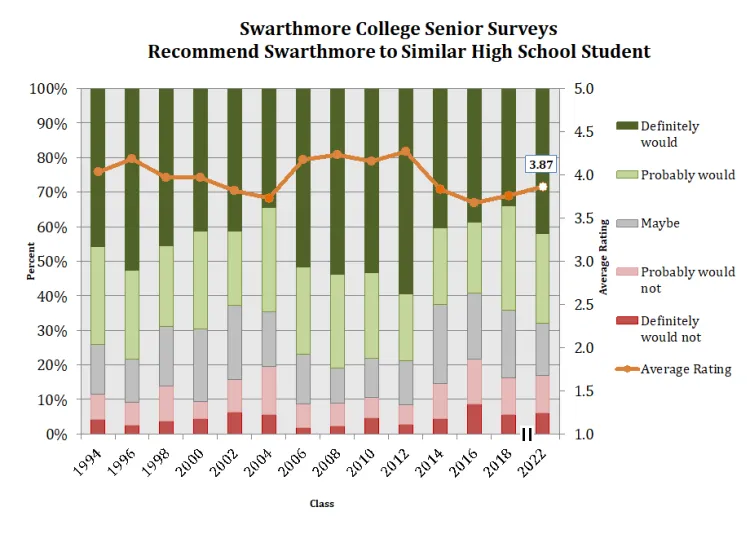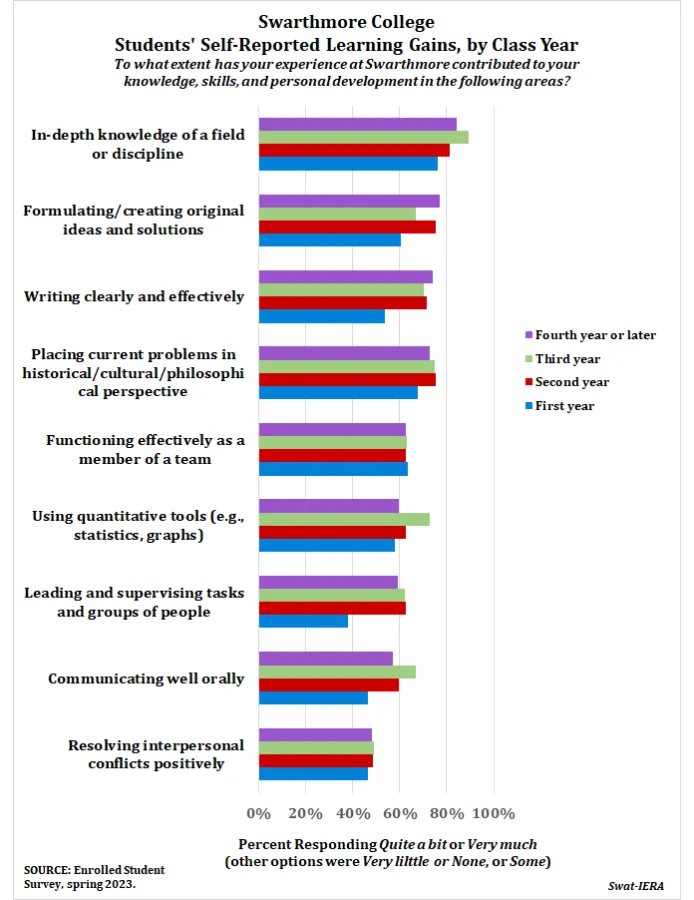Institutional Measures and Activities
This page contains information on each of the following areas. Please click on the topic to skip to it.
Activities and Projects | Student Outcomes | Student Learning
Data provided in these sections (click to skip to charts):
Chart of Seniors' ratings of overall satisfaction with undergraduate education
Chart of Seniors' ratings of whether they'd recommend the College
Chart of Learning Gains
Activities and Projects
The College engages in numerous routine and ad hoc projects and activities that support and inform our assessment efforts. A few are listed below.
Alumni Surveys — Swarthmore conducts several sorts of Alumni Surveys. A survey of Classes 5, 10, and 20 years out (generally) is conducted along with a group of several dozen peer colleges and universities about every 5 years. These surveys collect feedback about learning gains, the contributions of various undergraduate experiences, graduate degree attainment, employment and current activities of these graduates. Our Alumni Records Office annually conducts surveys in anticipation of reunion years, and these surveys provide feedback about outcomes. Finally, many of our departments and programs undergoing reviews conduct alumni surveys of their majors and minors which specifically assess the effectiveness of experiences in the department or program. Summaries of results may be found here.
Enrolled Student Survey — Swarthmore conducts an institution-wide survey of all enrolled students every four years, along with the peer group mentioned above. The survey includes self-assessments of learning gains, engagement with various aspects of the College, and many other areas of feedback.
Science and engineering initiatives supported by a grant from the Howard Hughes Medical Institute (HHMI). One of the major initiatives of the 2008-2012 grant was the peer mentor programs, with a special focus on the Biology and Mathematics and Statistics Departments. These programs are designed to support student learning and to promote and sustain a diverse population of students in the sciences, and the model has since been extended to other disciplines within and beyond the sciences. The assessment of the programs are an important part of the College's work, and is undertaken through the use of multiple measures, including analysis of institutional and program experience data, surveys of students and peer mentors, focus groups, and interviews.
Senior Plans Survey — Swarthmore conducts an annual survey of graduating seniors, which collects information about their immediate plans for employment or graduate school. The Career Services Office shares summaries of these results with the College Community and with the public (see below).
Senior Perspectives Survey — Swarthmore conducts a biennial senior survey, along with a group of peers. (Note that the survey was not conducted in 2020.) The survey provides feedback from graduating seniors about learning gains, evaluations of their experiences in the major, ratings of administrative areas, and much more. The Institutional Effectiveness, Research & Assessment office routinely summarizes and shares this feedback with appropriate areas of the College (administrative offices, academic departments, and the College) for their use in assessment and planning.
Two of the items from the survey are monitored as a general reflection of student experience:
- Overall, how satisfied are you with your undergraduate education? and;
- Would you encourage a current high school senior who resembles you when you were a high school senior (similar background, ability, interests, and temperament) to attend your undergraduate institution?
Each item has five response options ranging from "very dissatisfied" to "very satisfied" for the first, and from "definitely would not" to "definitely would" for the second. Results for these two items are presented below.

Trend data from the Classes of 1994 through 2022 reflecting ratings of overall satisfaction with undergraduate education.

Trend data from the Classes of 1994 through 2022 reflecting ratings of whether they would recommend the College to a similar high school student.
While ups and downs on these measures are to be expected, the College looks at any changes, and explores factors that might be related to them, including other areas reflected in the survey or in institutional data. In this way these measures help us to "take a pulse" on our students' experiences, and identify areas for improvement.
Staffing Study — Every three to five years Swarthmore and a group of about sixteen peer institutions participate in a study of non-faculty staffing by functional area. Results of this effort are carefully reviewed and discussed by presidents's staff and the divisions. This information is used for planning and decision making.
Student Outcomes (back to top)
Doctoral degrees awarded [pdf] to Swarthmore graduates, by broad discipline area, most recent year.
Honors (determined by external examiners) [pdf] — The Swarthmore College Honors Program rests on the principle that judgment concerning the achievement of honors at the College should be based on an independent evaluation of a student's work, and it is from this principle that the external examination derives. The outside examiners determine the only graduation honorifics available to Swarthmore students.
Medical School Applications [pdf] — and acceptances to medical school by Swarthmore seniors and recent alumni are provided, as well as their mean MCAT scores.
Plans of recent graduates from the annual Senior Plans Survey conducted by the Career Services Office.
Rate of doctoral degree attainment by Swarthmore graduates.
Retention and Graduation Rates [pdf] (chart) - Swarthmore retention and graduation rates are among the highest in the country.
Student Learning (back to top)
Indirect measures of student learning are collected routinely through self-report on institution-wide surveys of all students, graduating seniors, and alumni. (See the full list of College Surveys and their frequency at the Institutional Effectiveness, Research & Assessment website.) Presented below are the learning gains reported on the most recent of these, the Enrolled Student Survey, conducted in 2023.




